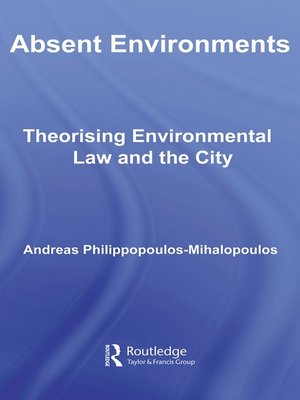Absent Environments
ebook ∣ Theorising Environmental Law and the City · Law, Science and Society
By Andreas Philippopoulos-Mihalopoulos

Sign up to save your library
With an OverDrive account, you can save your favorite libraries for at-a-glance information about availability. Find out more about OverDrive accounts.
Find this title in Libby, the library reading app by OverDrive.



Search for a digital library with this title
Title found at these libraries:
| Library Name | Distance |
|---|---|
| Loading... |
Offering a novel, transdisciplinary approach to environmental law, its principles, mechanics and context, as tested in its application to the urban environment, this book traces the conceptual and material absence of communication between the human and the natural and controversially includes such an absence within a system of law and a system of geography which effectively remain closed to environmental considerations.
The book looks at Niklas Luhmann's theory of autopoiesis. Introducing the key concepts and operations, contextualizing them and opening them up to critical analysis. Indeed, in contrast to most discussions on autopoiesis, it proposes a radically different reading of the theory, in line with critical legal, political, sociological, urban and ecological theories, while drawing from writings by Husserl and Derrida, as well as Latour, Blanchot, Haraway, Agamben and Nancy.
It explores a range of topics in the areas of environmental law and urban geography, including:
The author redefines the traditional foundations of environmental law and urban geography and suggests a radical way of dealing with scientific ignorance, cultural differences and environmental degradation within the perceived need for legal delivery of certainty.







